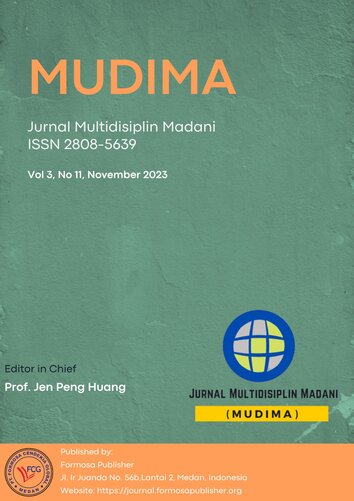The Relationship Between School Well-Being with Online Learning Motivation During the Covid-19 Pandemic in Psychology Students
DOI:
https://doi.org/10.55927/mudima.v3i11.6539Keywords:
Learning Motivation, Online Learning, School Well-BeingAbstract
The role of school well-being and learning motivation is one of the factors that become success in the application of online learning. This study aims to find out how the relationship between school well-being with learning motivation in online learning. This research involved 325 students of the Faculty of Psychology, Makassar State University. This study used a simple random sampling technique to select samples from the population. The data obtained are analyzed using product moment analysis techniques. The results of the study found a positive and significant relationship between school well-being and learning motivation (r = 0.507; p = 0.000). Other findings in the study showed that by gender there was no significant difference in learning motivation score outcomes, and there were significant differences in school well-being outcomes. The results of this study show a fairly strong level of correlation, so that the higher the school well-being experienced by active students of the Faculty of Psychology, Makassar State University, the higher the level of learning motivation during students
References
Bhat, R. H., & Naik, A. R. (2016). Relationship of academic intrinsic motivation and psychological well-being among students. International Journal of Modern Social Sciences Journal Homepage: Www.ModernScientificPress.Com Int. J. Modern Soc. Sci, 5(1), 66–74. Retrieved from www.ModernScientificPress.com/Journals/IJMSS.aspx
Breva, A., & Galindo, M. P. (2020). Types of motivation and eudemonic well-being as predictors of academic outcomes in first-year students: A self-determination theory approach. PsyCh Journal, 9(5), 609–628. https://doi.org/10.1002/pchj.361
Brophy, J. (2010). Motivating student to learn (3rd ed.). New York: New York: Routledge.
Downey, D. B., & Yuan, A. S. V. (2005). Sex differences in school performance during high school: Puzzling patterns and possible explanations. Sociological Quarterly, 46(2), 299–321. https://doi.org/10.1111/j.1533-8525.2005.00014.x
Effendi, A. S., & Siswati. (2016). Hubungan antara school well-being dengan intensi delinkuensi pada siswa kelas XI SMK Negeri 5 Semarang. Jurnal Empati, 5(2), 195–199.
Fauziah, A., Rosnaningsih, A., Azhar, S., Studi, P., Guru, P., Dasar, S., & Tangerang, U. M. (2017). Hubungan Antara Motivasi Belajar Dengan Minat Belajar Siswa Kelas IV SDN Poris Gaga 05 Kota. Jurnal JBSD, 4(2), 47–53. Retrieved from http://journal.uad.ac.id/index.php/jpsd/article/view/9594
Ferreira, M., Cardoso, A. P., & Abrantes, J. L. (2011). Motivation and relationship of the student with the school as factors involved in the perceived learning. Procedia - Social and Behavioral Sciences, 29, 1707–1714. https://doi.org/10.1016/j.sbspro.2011.11.416
Froiland, J. M., & Worrell, F. C. (2016). Intrinsic motivation, learning goals, engagement, and achievement in a diverse high school. Psychology in the Schools, 53(3), 321–336. https://doi.org/doi: 10.1002/pits.21901
Gagné, M., Ryan, R. M., & Bargmann, K. (2003). Autonomy Support and Need Satisfaction in the Motivation and Well-Being of Gymnasts. Journal of Applied Sport Psychology, 15(4), 372–390. https://doi.org/10.1080/714044203
Garn, A. C., & Jolly, J. L. (2013). High Ability Students’ Voice on Learning Motivation. Journal of Advanced Academics, 25(1), 7–24. https://doi.org/10.1177/1932202X13513262
Graham, C., & Chattopadhyay, S. (2013). Gender and well-being around the world. International Journal of Happiness and Development, 1(2), 212. https://doi.org/10.1504/ijhd.2013.055648
Harandi, S. R. (2015). Effects of e-learning on Students’ Motivation. Procedia - Social and Behavioral Sciences, 181, 423–430. https://doi.org/10.1016/j.sbspro.2015.04.905
Hasanah, M., & Sutopo. (2020). Pengaruh School Well-Being Terhadap. Jurnal Institut Pesantren Sunan Drajat (INSUD) Lamongan, 15(02), 34–42.
Hung, M. L., Chou, C., Chen, C. H., & Own, Z. Y. (2010). Learner readiness for online learning: Scale development and student perceptions. Computers and Education, 55(3), 1080–1090. https://doi.org/10.1016/j.compedu.2010.05.004
Khatimah, H. (2015). Gambaran School Well-Being pada Peserta Didik Program Kelas Akselerasi di SMA Negeri 8 Yogyakarta. PSIKOPEDAGOGIA Jurnal Bimbingan Dan Konseling, 4(1), 20. https://doi.org/10.12928/psikopedagogia.v4i1.4485
Khoshnam, A. H., Ghamari, M., & Gendavani, A. G. (2013). The Relationship between Intrinsic Motivation and Happiness with Academic Achievement in High School Students. International Journal of Academic Research in Business and Social Sciences, 3(11). https://doi.org/10.6007/ijarbss/v3-i11/342
Konu, A., & Rimpelä, M. (2002). Well-being in schools: A conceptual model. Health Promotion International, 17(1), 79–87. https://doi.org/10.1093/heapro/17.1.79
Kulkarni, S., Afshan, N., & Motwani, J. (2018). The impact of faculty member’s communication behaviours on student satisfaction: The role of cognitive and affective learning and student’s motivation. International Journal of Productivity and Quality Management, 25(4), 444–458. https://doi.org/10.1504/IJPQM.2018.096087
Lakhani, P. K., Jain, K., & Chandel, P. K. (2017). School Adjustment, Motivation and Academic Achievement among Students. Journal Homepage: International Journal of Research in Social Sciences, 7(December), 2249–2496.
Legault, L., Green-Demers, I., & Pelletier, L. (2006). Why do high school students lack motivation in the classroom? Toward an understanding of academic amotivation and the role of social support. Journal of Educational Psychology, 98(3), 567–582. https://doi.org/10.1037/0022-0663.98.3.567
Liu, Y., Hau, K. T., Liu, H., Wu, J., Wang, X., & Zheng, X. (2020). Multiplicative effect of intrinsic and extrinsic motivation on academic performance: A longitudinal study of Chinese students. Journal of Personality, 88(3), 584–595. https://doi.org/10.1111/jopy.12512
Malini, G. A. N. D., & Fridari, I. G. A. D. (2019). Perbedaan motivasi belajar siswa ditinjau dari jenis kelamin dan urutan kelahiran di SMAN 1 Tabanan dengan sistem full day school. Jurnal Psikologi Udayana, 032, 145–155. Retrieved from https://ojs.unud.ac.id/index.php/psikologi/article/view/52513
Margolang, N., Hermita, N., & Antosa, Z. (2019). The Correlations between Reward and Elementary School Students’ Learning Motivation. Journal of Teaching and Learning in Elementary Education (Jtlee), 2(1), 64. https://doi.org/10.33578/jtlee.v2i1.6693
Maria, A. M., & Astuti, N. W. (2020). School Well-Being With Student Learning Motivation in Active Students in Extracurricular Activities at X Senior High Schools in North Jakarta Region. 478(Ticash), 603–609. https://doi.org/10.2991/assehr.k.201209.093
McCoach, D. B., & Siegle, D. (2003). Factors that differentiate underachieving gifted students from high-achieving gifted students. Gifted Child Quarterly, 47(2), 144–154. https://doi.org/10.1177/001698620304700205
Milyavskaya, M., & Koestner, R. (2011). Psychological needs, motivation, and well-being: A test of self-determination theory across multiple domains. Personality and Individual Differences, 50(3), 387–391. https://doi.org/10.1016/j.paid.2010.10.029
Nakayama, M., Mutsuura, K., & Yamamoto, H. (2014). Impact of learner’s characteristics and learning behavior on learning performance during a fully online course. Electronic Journal of E-Learning, 12(4), 394–408. https://doi.org/ISSN: 1479-4403
Pilkington, O. A. (2018). Active Learning for an Online Composition Classroom: Blogging As an Enhancement of Online Curriculum. Journal of Educational Technology Systems, 47(2), 213–226. https://doi.org/10.1177/0047239518788278
Rachmah, E. N. (2016). Pengaruh school well-being terhadap motivasi belajar siswa. PSYCHOSCIENCE, 11(2), 99–108. https://doi.org/ISSN: 1907-5235
Rogowska, A. M., Kuśnierz, C., & Bokszczanin, A. (2020).
Examining Anxiety, Life Satisfaction, General Health, Stress and Coping Styles During COVID-19 Pandemic in Polish Sample of University Students
. Psychology Research and Behavior Management, Volume 13, 797–811. https://doi.org/10.2147/prbm.s266511Ryan, R. M, & Deci, E. L. (2017). Self-determination theory: Basic psychological needs in motivation, development, and wellness. New York: New York: The Guilford Press.
Ryan, R. M., & Deci, E. L. (2000a). Intrinsic and Extrinsic Motivations: Classic Definitions and New Directions. Contemporary Educational Psychology, 25(1), 54–67. https://doi.org/10.1006/ceps.1999.1020
Ryan, R. M., & Deci, E. L. (2000b). Self-determination theory and the facilitation of intrinsic motivation, social development, and well-being. American Psychology Association, 55(1), 68–78. https://doi.org/doi: 10.1037110003-066X.55.1.68
Schunk, D. H., & Usher, E. L. (2012). Social Cognitive Theory and Motivation. The Oxford Handbook of Human Motivation, (May 2018), 1–29. https://doi.org/10.1093/oxfordhb/9780195399820.013.0002
Shillingford, S., & Karlin, N. J. (2013). The role of intrinsic motivation in the academic pursuits of nontraditional students. New Horizons in Adult Education and Human Resource Development, 25(3), 91–102. https://doi.org/10.1002/nha3.20033
Vallerand, R. J., Pelletier, L. G., Blais, M. R., Briere, N. M., Senecal, C., & Vallieres, E. F. (1992). The academic motivation scale: A measure of intrinsic, extrinsic, and amotivation in education. Educational, and Psychological Measurement, 52(4), 1003–1017. https://doi.org/doi:10.1177/0013164492052004025
Yamin, G., & Muzaffar, R. (2021). Academic motivation and psychological well-being of university students taking online clasess amid covid-19 pandemic. Bahria Journal of Professional Psychology, 20(2), 51–61. https://doi.org/E-ISSN: 2789-2808
Downloads
Published
How to Cite
Issue
Section
License
Copyright (c) 2023 Aphroditha Salsabilla Renjaan, Eva Maizara Puspita Dewi, Nur Akmal

This work is licensed under a Creative Commons Attribution 4.0 International License.
































